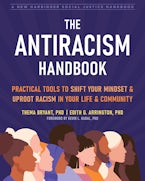By Edith G. Arrington, PhD, coauthor of The Antiracism Handbook
In her recent New Harbinger blog, Thema Bryant, my colleague, friend, and coauthor of The Antiracism Handbook, wrote compellingly about justice being therapeutic. She reminds those of us committed to an antiracism journey that: “engaging in activism, advocacy, and social justice work can provide you with a sense of hope, agency, and community support.” When we commit to antiracism, we can empower ourselves to continue to fight for justice and move toward healing from the impact of racism. And, as we heal individually, we can contribute to healing our communities as well.
Community health and healing are important for so many reasons. Our communities are where we live, love, work, play, worship, and grow. And since racism is not only expressed on an individual level, but also at structural and institutional levels, our communities are where we encounter racism as well. For this reason, our antiracist efforts can’t be viewed solely as about our personal growth. When we commit to antiracism, we are working to fight racism across the multiple levels we confront it. We are making the decision to advocate for racial justice and cultivate healing for ourselves and in our communities.
The decision to commit to antiracism is one we need to continue to affirm. The reality is that committing to antiracism can be challenging. Individually you may confront various emotions like fear or guilt that have kept you from speaking up or taking action against racism. On community and systemic levels, racism has been one of the defining features of our society across so many generations. Yet we still see debates being waged about whether racism actually exists; often led by those who have indirectly or directly benefitted from it. Meanwhile, racially marginalized communities continue to be negatively impacted by racism. This can be dispiriting and exhausting for those committed to antiracism. What are some things we can do to sustain our engagement in antiracism?
First and foremost, we need to make sure we take care of ourselves and our communities. A key part of this self- and community-care is fostering authentic connection to those friends, colleagues, and community members who acknowledge the real ways racism continues to matter and are committed to working for racial equity and justice. Authentic connection means we are able to speak our truth and let our guard down because we know and trust that others will respect who we are.
Since structural racism has contributed to disparities that have been built over time, addressing these inequities will take more than individual efforts (though you should certainly continue to deepen a personal commitment to antiracism in your spheres of influence). Find those opportunities where you can work with those you identified as authentic connections to take collective action to address racism in your community.
Finally, when you can, show up for those communities that you may not be a member of yourself but who are fighting racial injustices they encounter. Multiracial coalitions, where people from different racial groups make a commitment to work together to confront racism, have been central to so many of the racial justice movements that have successfully moved our society forward over time.
As you commit to antiracism in your life and community, think about the ways that you can participate in collective action and multiracial coalitions while cultivating authentic connections. This will help you stay engaged in individual- and community-level antiracism efforts. And remember, by sustaining your antiracism engagement, you’re also promoting health and healing for you and your community.
Edith G. Arrington, PhD, is a licensed psychologist and consultant to schools, nonprofits, and community organizations whose work focuses on race, identity, development, and education; equity, diversity, and inclusion; and promoting health and well-being for individuals and communities.



 Why Journaling Is Especially Helpful to Adult Children of Emotionally Immature Parents
Why Journaling Is Especially Helpful to Adult Children of Emotionally Immature Parents